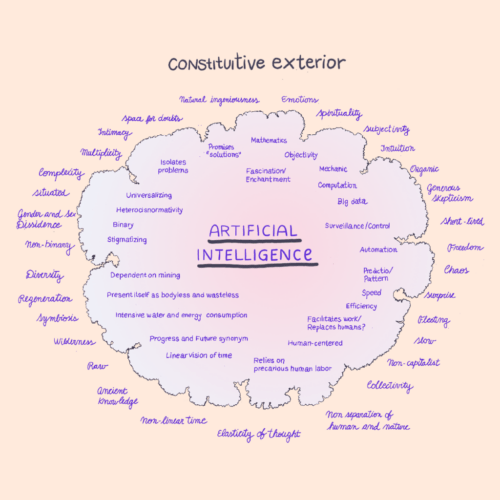The compost engineers and sus los saberes lentos: a manifest for regenerative technologies
#artificial intelligence #speculative futuresCan we switch tech imaginaries towards regenerative systems instead of extractivist tech for war, anxiety and domination?
Digging from colonial sci-fi narratives to the history of tech development, Joana Varon and Lucía Egaña depart from the assumption that “AI” is a loaded terminology, sparking very limited imaginaries of possible futures: Silicon Valley and Hollywood’s fast metallic colonial and patriarchal futures. What valuable feminist concepts are left behind when we use the term “AI”? Starting from the idea of constituitive exterior of AI, the authors developed the diagram below to expose these concepts:

Can we inspire tech development with this concepts left outside? Can ingeniousness focused on regeneration be prioritized as intelligent tech? What about situated, non-universalizing, non-human-centric technologies connected to other rhythms, slower than capitalism’s pace?
Reclaiming this concepts that are left behind when we use the term artificial intelligence, the researchers propose alternative epistemologies and practices for technological development that recognize our current context of climate emergency and realign with ancestral knowledges, which got depreciated by colonial violences that have crossed time and are still present in the development of digital technologies. After a brief immersion in Biology and Ecology studies, focused on mycology, soil studies, and a symbiotic approach to evolution, using radical imagination and speculative narratives, they propose a decolonial feminist tech prototype: the compost engineers’ regenerative systems, conceived in a design framework that combines: Design Justice Principles, Permaculture Design Principles, and Fungi Foundation Principles. To “train the model” it runs ancestral technologies.
Part of this journey was also inspired by three interviews conducted from June to August 2023 with Chilean biotechnologist Daniela Torres, director of the Chile office of the Fungi Foundation; Cinthia Mendonça, director of Silo, a rural station in Brazil that is designed to search for interrogations and answers to the challenging questions of our time, offering experiences for knowledge exchange and human development, working with art, science, technology and agroecology, and Denise Alves-Rodrigues, queer technologist, maker, artist and educator, inspired in repositioning other technologies in the same status as digital technologies.
From the territories we inhabit, it is impossible not to link technologies with their globally distributed and geopolitically interconnected effects. In this sense, we seek to consider how feminist technology can serve the restoration, repair, and preservation of territories and their knowledge.
Special thanks to the interviewees and to the Latin American chapter of the Feminist AI Research Network f<ai>r, chaired by Paola Ricaurte, with support from International Development Research Centre (IDRC) through A+ Alliance and to Cony for the design and illustrations.
The original research is available here.
About the authors
Joana Varon is Brazilian, with Colombian ancestry, Founder-Directress and Creative Chaos Catalyst at Coding Rights, is a feminist organization that contributes to the debates about the development, implementation and regulation of technologies from a collective, transfeminist, decolonial, and antiracist perspective of human rights, through creativity and hacker knowledge it seeks to stimulate imaginaries and actions that challenge power inequalities. Alumni at the Berkman Klein Center for Internet and Society at Harvard University. Former Technology and Human Rights Fellow at the Carr Center for Human Rights Policy from Harvard Kennedy School
and Mozilla Alumni as former Media Fellow. Feminist and human rights advocate, she has more than 15 years of experience in influencing debated on internationals arenas of tech governance, from diplomatic to technical foras, like the Internet Engineering Task Force (IETF), where she was part of the group of researchers who kick-started the working group on Human Rights Considerations for Standards and Protocols. She is also co-creator of several projects operating in the interplay between activism, arts and technologies, such as transfeministech.org, cartografiasdainternet.org, museamami.org, chupadados.com, safersisters, Safer Nudes, protestos.org, Net of Rights and freenetfilm.org.
Lucía Egaña Rojas studied Art, Aesthetics and Creative Documentary, and has a PhD in Audiovisual Communication. As an artist she works on projects that problematize the construction of social imaginaries and the sources of hegemonic knowledge. Her projects are formalized through artistic production, writing, research, pedagogy and self-institutional practices. Her artistic work cannot be circumscribed to a specific medium and can be consulted at http://luciaegana.net. In the educational field, she circulates between academic spaces and informal pedagogies. She has been a teacher and part of the academic direction of the Programa de Estudios Independientes (Independent Studies Program, PEI) of the Museum of Contemporary Art of Barcelona (MACBA), associate professor at the Faculty of Fine Arts of the University of Barcelona, guest lecturer at the Master of gender at the University of Chile and the master MUECA (UMH). Within the transfeminist activism, she has been an organizer of the Muestra Marrana postpornography festival and in 2011 she made the documentary “Mi sexualidad es una creación artística” and currently co-directs the Instituto de Estudios del Porno. Her writing work explores different formats, from fiction to essay, through poetic prose, manifesto and academic text. She has published Enciclopedia del amor en los tiempos del porno (Cuarto propio, 2014; Trío editorial, 2020), Atrincheradas en la carne. Lecturas en torno a las prácticas postpornográficas (Bellaterra, 2018), Acá soy la que se fue (tictac ediciones, 2019), Una cartografía extraña (Metales Pesados, 2021), among others. Her artistic work is expressed a lot in collective, where she participates in the Musea M.A.M.I, the Centro de Estudios de la Naturaleza Extractiva (CENEx) and Pluriversidad Nómada, a project promoted together with Quimera Rosa. Her main interests have to do with feminisms, methodologies, technology, north-south power relations, colonial and migratory processes, extractivism and error.
